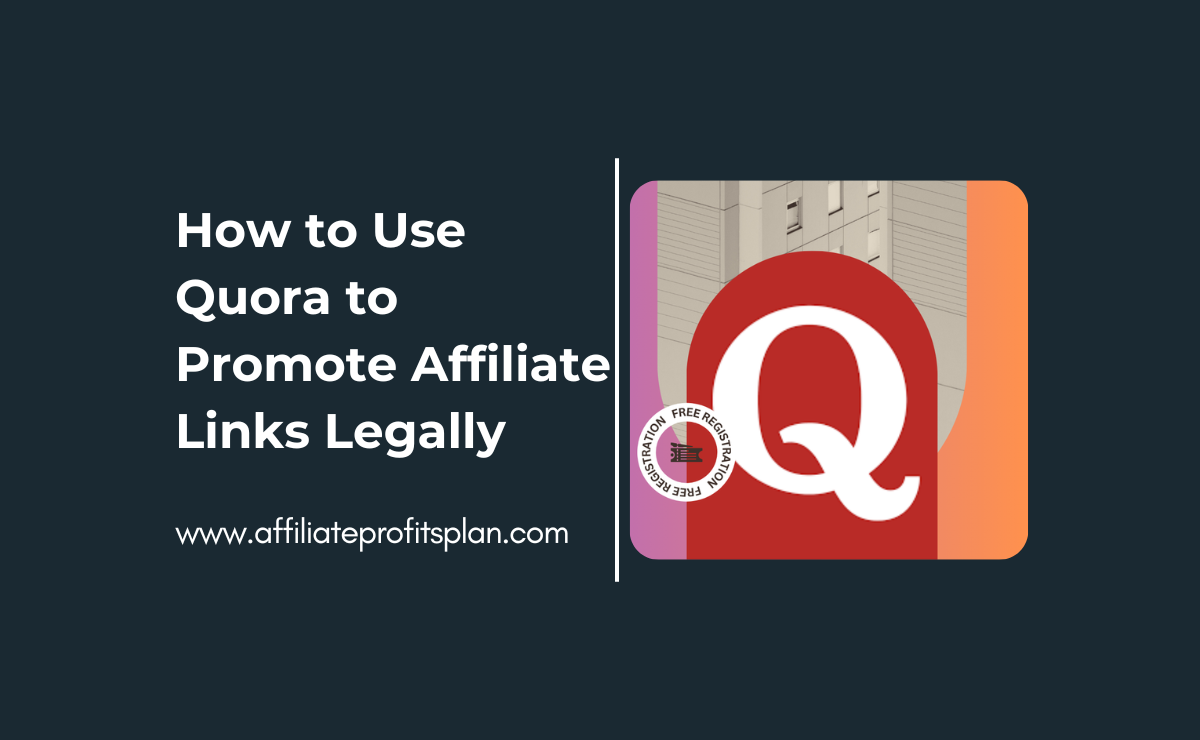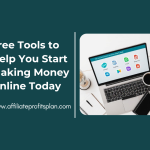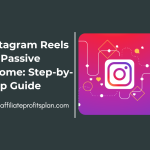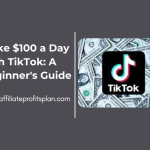Welcome to my article “How to Use Quora to Promote Affiliate Links Legally” Quora is like that one friend who knows the answer to almost every question—whether it’s about quantum physics, the best pizza in New York, or how to get your affiliate marketing campaign to soar. With millions of users asking and answering questions daily, Quora has become a goldmine for marketers looking to drive traffic, build authority, and yes, promote affiliate links. But—and this is a big “but”—you can’t just throw your affiliate links around like confetti at a New Year’s party. Quora has strict rules, and if you’re not careful, you might find your account in a time-out (or worse, banned).
So, how can you use Quora to promote affiliate links legally without crossing any lines? The answer lies in strategy, patience, and a dash of creativity. In this guide, we’ll walk you through how to effectively integrate affiliate marketing into your Quora answers in a way that adds value to the conversation and keeps the platform’s moderators happy. It’s all about providing genuine, helpful responses while weaving your affiliate products in like a pro.
If you’re worried about getting caught and your affiliate links being labeled as spam, don’t fret! You don’t need to be a Quora ninja to follow the rules and succeed. By the end of this post, you’ll be equipped with practical tips and strategies to make your affiliate marketing efforts on Quora both legal and successful. Ready to turn your answers into affiliate income? Let’s dive in!
Access Our Proven Tested Formula for $50-$100 Daily Income – Watch This FREE Video >>
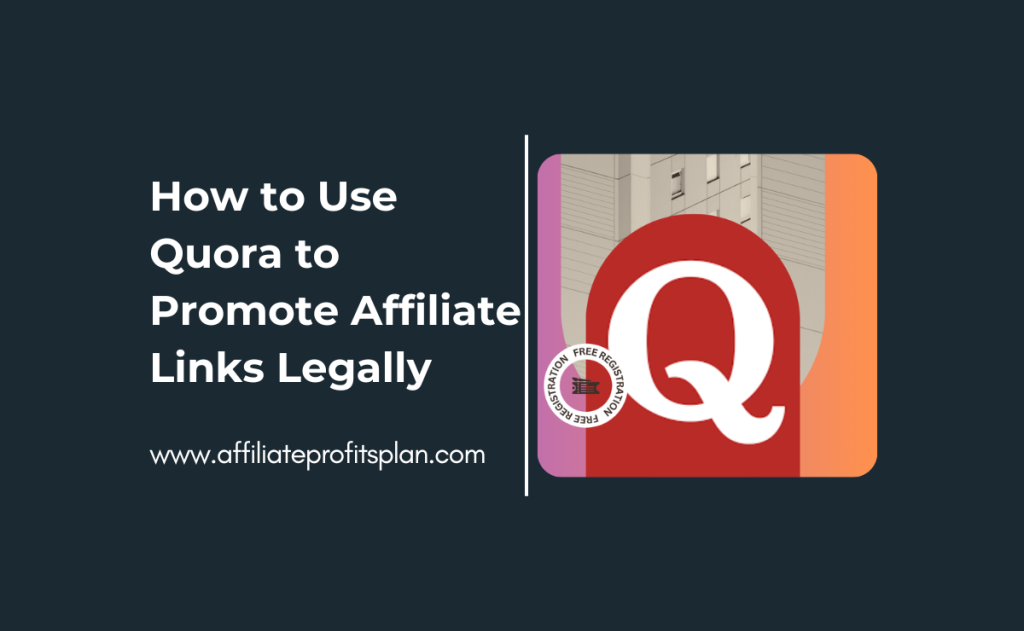
Understanding Quora’s Rules and Policies on Affiliate Links
Before you dive headfirst into promoting affiliate links on Quora, it’s crucial to understand the platform’s rules and policies. Think of Quora like a well-guarded fortress—sure, you can walk right in, but if you try to sneak past security with your affiliate links, you might get kicked out faster than a spam comment on a YouTube video. So, what exactly does Quora say about affiliate marketing? Spoiler alert: it’s not a free-for-all.
First, Quora’s primary rule is that you should be genuinely contributing to the conversation. You can’t just copy-paste your affiliate link with a one-liner answer and call it a day. If your answer is purely self-promotional, it’s likely to be flagged or deleted. Quora’s community is built around helping users, so your goal should always be to provide valuable information that solves a problem, answers a question, or adds insight to a topic. Think of affiliate links as a helpful, but secondary tool in your answer—like an extra spoonful of sugar in your favorite cake recipe.
While Quora doesn’t completely ban affiliate links, they do make it clear that these links should not be spammy or deceptive. For example, if you’re linking to a product, your answer should genuinely discuss its benefits in relation to the question being asked. If you’re writing about a travel destination, it’s okay to mention a travel guidebook through an affiliate link if it fits naturally into your answer. But remember, no “click here to buy this right now” tactics. Keep it relevant, helpful, and subtle. The key is to make sure that the affiliate link is truly beneficial to the reader—helping them make a decision or learn more about something in an honest and transparent way.
Lastly, always be mindful of Quora’s specific policies on spam and advertising. Quora’s community guidelines don’t tolerate the overuse of affiliate links or unsolicited self-promotion. So, don’t go around posting affiliate links in every answer or hijacking threads with links to random products. You’ll be labeled a spammer quicker than you can say “affiliate marketing.” In short, the golden rule is: don’t be pushy, don’t be salesy, and always add value to the discussion.
Finding Relevant Questions to Answer
Alright, now that you’ve got a grasp on Quora’s rules, it’s time to put on your detective hat and start hunting for the right questions to answer. Think of Quora as a treasure chest full of potential affiliate marketing opportunities, but the key is knowing where to look for the hidden gems—because let’s face it, you’re not going to make much money answering questions like “What’s your favorite color?” or “Do aliens exist?” unless your affiliate link happens to be for a book on alien conspiracy theories (which, hey, I won’t judge).
So, how do you find the perfect questions to answer? Simple: start by searching for topics related to your niche. Quora’s search bar is your best friend here. Let’s say you’re promoting a fitness product—type in “how to get fit” or “best workout equipment” into the search bar, and voilà, a list of questions will pop up like magic. Now, you can pick and choose the ones that align with the product you’re promoting. It’s like online dating, but for affiliate links—pick the questions that match your offering and have a potential to make a connection with your audience.
But wait—don’t just rush to answer any question with “affiliate link here” in mind. You want to find questions that are actively engaging users and generating a lot of upvotes or comments. These are usually the questions that resonate with a large audience, and your answer will be much more visible. So, aim for questions that have been answered recently, are getting a lot of attention, or have a clear need for expert advice. Plus, when you answer questions with high engagement, you increase the likelihood that your answer will rise to the top, and with that, your affiliate link gets more exposure.
Another great trick is to look for “quora requests”—these are questions where users specifically ask for recommendations or help. These are your golden opportunities! People coming to Quora for advice are usually open to suggestions, and if you offer a helpful answer with an affiliate link in a relevant, non-pushy way, you’ll be able to smoothly promote your product without sounding like a used car salesman.
Access Our Proven Tested Formula for $50-$100 Daily Income – Watch This FREE Video >>
The key here is balance: you want to find questions that are a good match for your niche, with enough engagement to give your answer traction, but you also don’t want to sound like you’re just there to promote your affiliate link. Keep it natural, add value, and watch as the opportunities unfold!
How to Incorporate Affiliate Links Naturally in Your Answers
Now that you’ve found some juicy questions to answer, it’s time to bring in the star of the show—your affiliate link. But here’s the catch: you don’t want to throw your link around like confetti at a New Year’s Eve party. Too many affiliate links plastered throughout your answer can make you look like a walking billboard, and trust me, nobody likes that. You want your affiliate link to be a seamless part of your response—like a ninja sneaking in at just the right moment, without anyone noticing. Let’s break down how to do that.
First things first, your answer should be helpful—always, always, always. No one cares about your affiliate link unless your answer genuinely solves their problem or provides value. So, before even thinking about your affiliate link, focus on giving a solid, well-thought-out response. Offer real advice, give them insights they might not have considered, and ensure that your answer comes off as knowledgeable and trustworthy. The better your answer, the more likely someone is to click your link—because they’ll trust you.
Once you’ve laid down some helpful context, it’s time to sprinkle in that affiliate link naturally. Here’s where you get creative: instead of saying, “Click here to buy this product,” try something more subtle. For instance, if you’re talking about fitness equipment, instead of blatantly plugging the product, you could say something like, “If you’re looking for a durable, high-quality treadmill that won’t break the bank, I’ve personally had great results with this one. You can check it out here.” Notice how the link is presented as part of the natural flow of the conversation? That’s how you want it to feel.
Another trick? Contextualize your link in a way that makes sense. For example, if you’re answering a question about SEO and mentioning a particular SEO tool, it makes total sense to include your affiliate link for that tool, especially if you’ve used it and genuinely recommend it. Be transparent about it! Quora users appreciate honesty, so you could add something like, “Full disclosure, this is an affiliate link, but I’ve personally used this tool, and it’s made a big difference in my SEO efforts.”
You can also add value by sharing personal experiences or case studies where the product or service you’re recommending has worked for you. Real-world examples are the secret sauce here—they make the recommendation more genuine and persuasive. Instead of just saying, “I think this tool is great,” try, “I was struggling with XYZ issue until I started using this tool. It really helped me to solve the problem by…”
Lastly, remember the golden rule: don’t overdo it. The key to affiliate marketing on Quora is moderation. If you find yourself constantly inserting affiliate links, it might come off as spammy. Aim to offer helpful advice with the link being a small, useful addition—like a cherry on top of an already delicious sundae.
Incorporating affiliate links on Quora doesn’t need to be a hard sell. When you focus on adding value, the affiliate link becomes a natural part of your answer, and more importantly, the right people will click on it because they trust you and find your recommendation helpful.
Leveraging Quora Spaces for Affiliate Marketing
Ah, Quora Spaces—the hidden gem of the Quora platform. While most affiliate marketers are busy answering questions, Quora Spaces offers a unique opportunity to get your affiliate links out there in a more engaging and community-driven way. It’s like having your own little corner of Quora to share knowledge, build trust, and yes—promote affiliate links—without being too in-your-face about it. But before you go wild with sharing links in every post, let’s talk about how to use Quora Spaces effectively for affiliate marketing.
First off, let’s clear up what a Quora Space is. It’s essentially a niche-focused community within Quora, where users can share content and discuss topics that fall under a specific theme or interest. Think of it as a mini-blog within Quora, but with a built-in audience that’s already interested in the subject matter. Spaces can range from personal finance and tech gadgets to lifestyle and health, so no matter what affiliate products you’re promoting, there’s likely a Space that aligns with your niche.
Now, how can you leverage Quora Spaces for affiliate marketing? Glad you asked! The key is in the way you approach your content. Rather than just blasting your affiliate links, you should focus on building relationships and trust within the Space. Think of it like hosting a dinner party—you wouldn’t invite someone over, plop down a sales pitch, and then ask them to leave, right? Similarly, you don’t want to enter a Space and immediately start spamming your affiliate links. The idea is to create content that adds value first and foremost.
Start by joining a few Spaces that are relevant to your affiliate products. Once you’re in, engage with the community by posting valuable, non-salesy content. You could write informative articles, share personal experiences, or even answer questions within the Space. The goal here is to establish yourself as a trusted expert. By offering helpful and insightful posts, you start building credibility—and that’s when your affiliate links can naturally sneak in.
For example, let’s say you’re promoting a course on personal finance. Instead of posting, “Click here to buy my course,” you could share an insightful post on budgeting tips and mention how taking that course helped you optimize your finances. Casually drop the affiliate link, but only after offering real value. The key here is context. Don’t just shove your link in there and call it a day—make sure the content you’re sharing is highly relevant and educational.
You can also leverage Quora Spaces’ ability to create discussions. Start conversations that revolve around problems your affiliate products or services can solve. For instance, if you’re promoting a productivity app, create a post in a productivity-focused Space that asks the community how they manage their time effectively. You can share your own experience with the app, giving your affiliate link a natural place in the discussion. By doing this, you’re creating engagement and making your affiliate link part of a helpful, ongoing conversation.
Another great tactic is curating content from multiple sources. Instead of just sharing your own articles, you can share others’ content, industry news, and even Quora answers (with proper credit, of course). This positions you as a valuable member of the Space while subtly weaving in your affiliate links when it’s appropriate. Curated content helps diversify your contributions, keeping you from coming off as overly promotional.
But wait—don’t forget about Quora’s rules! Just like with regular Quora answers, you must make sure your affiliate links comply with Quora’s guidelines. If you’re caught violating their terms, your account could get flagged. Make sure your links are disclosed, and don’t over-saturate your posts with them. A well-placed link with valuable content is always going to perform better than a blatant promotion.
Access Our Proven Tested Formula for $50-$100 Daily Income – Watch This FREE Video >>
In short, Quora Spaces is an underused yet powerful tool in the affiliate marketer’s toolbox. By joining the right Spaces, offering genuine value, and incorporating affiliate links in a subtle, helpful manner, you can drive traffic to your affiliate products without sounding like a used car salesman. So, go ahead—dive into Quora Spaces, establish your expertise, and let your affiliate marketing efforts grow organically!
Tracking and Measuring the Success of Your Affiliate Links on Quora
Okay, you’ve crafted the perfect answer, shared a killer post, and even sprinkled in your affiliate links like a pro. But how do you know if your efforts are paying off? How do you track whether your Quora affiliate marketing strategy is a roaring success or just a “meh” experience? Well, it’s all about the numbers, my friend. In this digital age, if you’re not measuring your results, it’s like throwing a dart with your eyes closed—good luck with that! So, let’s dive into how to effectively track and measure the success of your affiliate links on Quora.
First things first: link tracking tools are your best friend. You need a way to see how many clicks your affiliate links are getting, where those clicks are coming from, and, ideally, whether those clicks are converting into sales. Tools like Bitly, Google Analytics, and ThirstyAffiliates can make your life much easier. These tools allow you to create custom short links and monitor the performance of each one. You can track how many people clicked on your link, which Quora post or Space they came from, and even which geographic location they’re in. It’s like having a backstage pass to your affiliate marketing efforts!
But here’s the fun part—conversion tracking. Clicks are great, but conversions (aka sales) are the real goal. If you’ve sent 100 people to a landing page but no one’s buying, then it’s time to reassess your strategy. If you’re using a platform like Amazon Associates or ClickBank, they usually provide some built-in tracking tools that show you how many of those clicks actually resulted in a purchase. Don’t just stop at link clicks; make sure you’re tracking whether those clicks are driving actual revenue. The beauty of affiliate marketing is that you can easily set up conversion tracking on landing pages, and even link it directly with tools like Google Analytics. Talk about a full-circle view of your performance!
Now, A/B testing is your secret weapon when it comes to improving those conversion rates. Let’s say you’re sharing two different affiliate products or services across different Quora posts. One post might be getting a lot of clicks, but the other one is crickets. How do you figure out what works? Simple—test! Try different variations of your content—headlines, link placement, call-to-action (CTA) wording, and so on—and see which one performs best. By constantly testing and optimizing, you can figure out which approach gets you the most clicks and converts them into sales. Remember, affiliate marketing is not a “set it and forget it” game. It requires constant refinement and adjustment.
You should also be paying attention to Quora’s analytics. Quora offers insights into how your content is performing on the platform itself, including the number of views your posts and answers are getting. Combine that with your affiliate link tracking, and you’ll know exactly which posts are bringing in the clicks. If you notice one of your posts is getting a ton of views but not many clicks on the affiliate link, it might be time to tweak the way you’re incorporating the link or revisit the content to make sure it’s more persuasive. Or, it could simply be that the audience for that question isn’t quite right for your offer.
Next up: engagement metrics. While clicks and conversions are important, engagement is a great secondary indicator of success. How many people are commenting on your posts? Are they asking follow-up questions or giving positive feedback? These signals are a good indication that your answers are resonating with people—and if they’re engaging with your content, they’re more likely to trust your affiliate recommendations. Plus, the more comments and engagement you get, the more visibility your posts will gain on Quora. It’s a win-win situation!
Let’s not forget about long-term tracking. Sometimes affiliate marketing takes time to really gain momentum, especially on a platform like Quora. A post you wrote a few months ago might still be driving clicks and conversions, even if you’re not actively working on it anymore. So, it’s important to track your links over time, not just in the short term. Use a tool like Google Analytics to monitor the ongoing traffic from your Quora posts and how your affiliate links continue to perform. Don’t get discouraged if you don’t see immediate results—affiliate marketing is often a long game!
Lastly, keep an eye on ROI (Return on Investment). It’s easy to get caught up in the excitement of getting clicks, but remember, affiliate marketing is all about profitability. Track how much time and effort you’re putting into Quora versus the revenue you’re earning. Are your efforts worth the return? If not, it might be time to tweak your strategy or focus on higher-converting products.
In short, tracking and measuring success on Quora is essential if you want to see tangible results. By using tracking tools, analyzing Quora’s native insights, A/B testing your content, and keeping an eye on long-term performance, you can constantly refine your approach and improve your affiliate marketing game. So, don’t just sit back and hope for the best—put on your data scientist hat and start tracking those links like a pro! Because, as we all know, success doesn’t just happen—it’s measured, analyzed, and optimized for greatness.
Conclusion: The Quora Affiliate Marketing Magic
And there you have it, the ultimate guide to using Quora for promoting affiliate links in a legal, ethical, and effective way. If you’re thinking, “Wait, that’s it? I’m ready to dive into affiliate marketing on Quora now!”—well, you’re absolutely right. The strategies we’ve covered are your launchpad for affiliate success. But remember, affiliate marketing is like a marathon, not a sprint. Patience, persistence, and a dash of cleverness will get you far.
By understanding Quora’s rules and policies, you’re already a step ahead. There’s no need to worry about getting flagged or banned if you play by the rules and incorporate affiliate links organically. And let’s not forget about the power of finding the right questions to answer. Relevance is key, and it’s all about providing genuine value to the Quora community while seamlessly integrating your affiliate offers.
Access Our Proven Tested Formula for $50-$100 Daily Income – Watch This FREE Video >>
When it comes to adding affiliate links, the key is subtlety. No one likes a pushy salesperson, especially not on Quora. The magic lies in weaving your links naturally into thoughtful answers that help people solve real problems. And, hey, if you’re looking for a bonus tip: leverage Quora Spaces to expand your reach. It’s like a secret garden where you can nurture your content and engage with a dedicated audience.
But don’t just stop there—tracking your progress is crucial. You need to know what’s working and what’s not so that you can continuously tweak and optimize your strategy. It’s all about getting the right balance between clicks, conversions, and engagement. Once you’ve got that down, you’ll be well on your way to affiliate marketing stardom.
So, go ahead, start crafting those Quora answers, and remember that success doesn’t come overnight—it’s about building trust, creating value, and knowing how to measure your wins. Keep tweaking your strategy, stay consistent, and most importantly—have fun with it! After all, you’re not just promoting products; you’re helping others, solving problems, and, yes, making a profit along the way. It’s a win-win.
Now go forth and conquer Quora like the affiliate marketing ninja you’re destined to be!
Thanks a lot for reading my article on “How to Use Quora to Promote Affiliate Links Legally” till the end. Hope you’ve helped. See you with another article.
